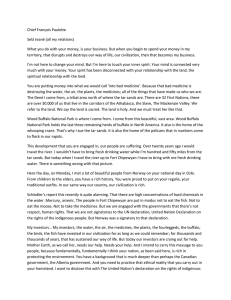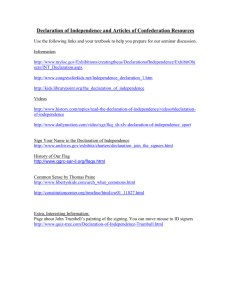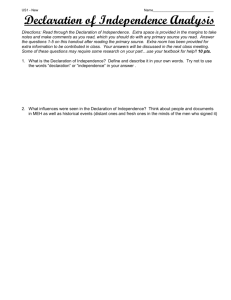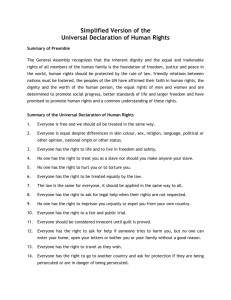Prime Minister Stephen Harper - FAQ-QNW
advertisement
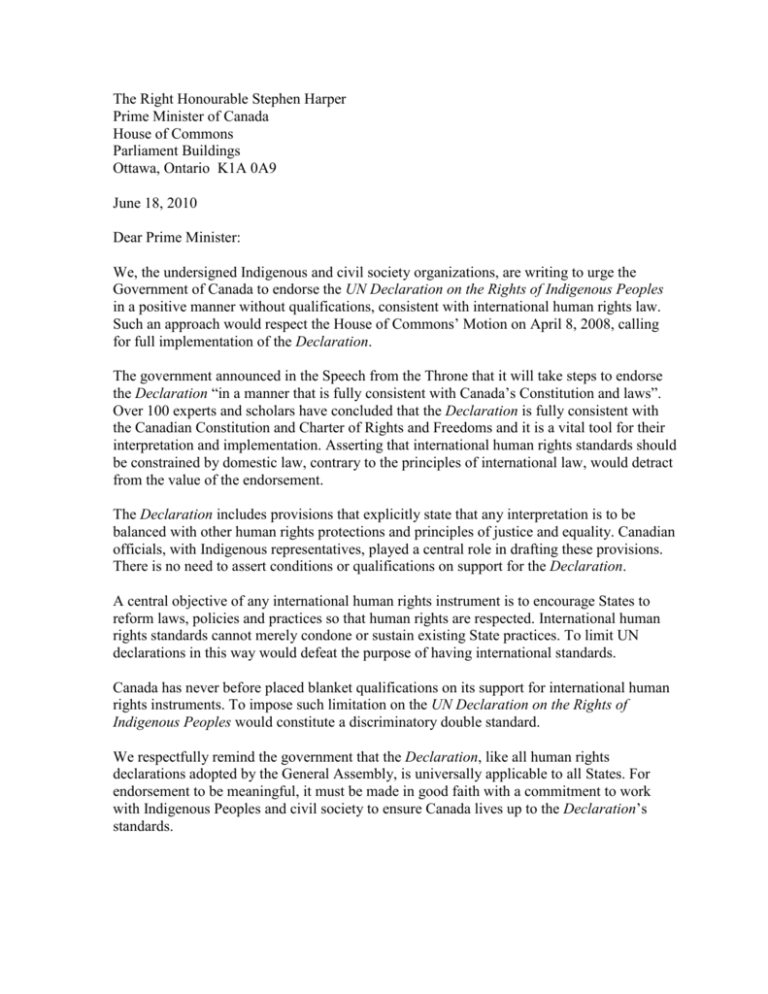
The Right Honourable Stephen Harper Prime Minister of Canada House of Commons Parliament Buildings Ottawa, Ontario K1A 0A9 June 18, 2010 Dear Prime Minister: We, the undersigned Indigenous and civil society organizations, are writing to urge the Government of Canada to endorse the UN Declaration on the Rights of Indigenous Peoples in a positive manner without qualifications, consistent with international human rights law. Such an approach would respect the House of Commons’ Motion on April 8, 2008, calling for full implementation of the Declaration. The government announced in the Speech from the Throne that it will take steps to endorse the Declaration “in a manner that is fully consistent with Canada’s Constitution and laws”. Over 100 experts and scholars have concluded that the Declaration is fully consistent with the Canadian Constitution and Charter of Rights and Freedoms and it is a vital tool for their interpretation and implementation. Asserting that international human rights standards should be constrained by domestic law, contrary to the principles of international law, would detract from the value of the endorsement. The Declaration includes provisions that explicitly state that any interpretation is to be balanced with other human rights protections and principles of justice and equality. Canadian officials, with Indigenous representatives, played a central role in drafting these provisions. There is no need to assert conditions or qualifications on support for the Declaration. A central objective of any international human rights instrument is to encourage States to reform laws, policies and practices so that human rights are respected. International human rights standards cannot merely condone or sustain existing State practices. To limit UN declarations in this way would defeat the purpose of having international standards. Canada has never before placed blanket qualifications on its support for international human rights instruments. To impose such limitation on the UN Declaration on the Rights of Indigenous Peoples would constitute a discriminatory double standard. We respectfully remind the government that the Declaration, like all human rights declarations adopted by the General Assembly, is universally applicable to all States. For endorsement to be meaningful, it must be made in good faith with a commitment to work with Indigenous Peoples and civil society to ensure Canada lives up to the Declaration’s standards. 2 Canadian courts are free to rely on the UN Declaration and other international instruments in interpreting Indigenous peoples’ human rights. The government’s endorsement of the Declaration is not necessary for it to be applicable in Canada. In a recent brief to the Canadian Human Rights Tribunal, the Attorney General of Canada argued: “Canada’s position on the Declaration has not changed. Consequently the Declaration should be given no weight as an interpretive source of law.” This argument is not supportable or sustainable. If the federal government is not prepared to apply the Declaration as a source of interpretation of its obligations, any endorsement will be hollow and will achieve a negative response from inside and outside Canada. Our organizations are also concerned that while the federal government has sought support for its endorsement strategy from provincial and territorial governments, no consultations with Indigenous Peoples have been carried out. Such actions unjustly treat Indigenous Peoples as adversaries and fail to uphold the honour of the Crown. The Declaration is especially useful in interpreting Indigenous Peoples’ Treaties with States. It serves to fill in any gaps from a human rights perspective. Such Treaties, including land claims agreements, embrace a diverse range of human rights. In its preamble, the Declaration is described as “a standard of achievement to be pursued in a spirit of partnership and mutual respect”. A clear and unequivocal statement of support for the UN Declaration is a necessary first step toward such a partnership. cc Michael Ignatieff Gilles Duceppe Jack Layton Chuck Strahl Lawrence Cannon Rob Nicholson Todd Russell Jean Crowder Marc Lemay Respectfully, Action Canada for Population and Development (ACPD) Amnesty International Canada Amnistie internationale Canada francophone Asia Pacific Working Group (APWG), Canadian Council for International Co-operation (CCIC) Assembly of First Nations of Québec and Labrador / Assemblée des 3 Premières Nations du Québec et du Labrador Canadian Arab Federation Canadian Council of Muslim Women Canadian Council on Social Development Canadian Federation of University Women Canadian Friends Service Committee (Quakers) Chiefs of Ontario Confédération des syndicats nationaux - CSN David Suzuki Foundation Fédération des femmes du Québec Fédération des travailleurs et travailleuses du Québec (FTQ) Federation of Saskatchewan Indian Nations First Nations Child and Family Caring Society of Canada First Nations Summit First Peoples Human Rights Coalition Front d'action populaire en réaménagement urbain - FRAPRU Grand Council of the Crees (Eeyou Istchee) Independent Jewish Voices Indigenous World Association Innu Council of Nitassinan International Organization of Indigenous Resource Development Inuit Circumpolar Council (Canada) KAIROS: Canadian Ecumenical Justice Initiatives Ligue des droits et libertés National Association of Friendship Centres National Council of Women of Canada Native Women’s Association of Canada Oxfam Canada Peace Brigades International-Canada Public Service Alliance of Canada (PSAC) Quebec Native Women / Femmes autochtones du Québec 4 Regroupement des centres d'amitié autochtones du Québec RightOnCanada The First Nations Confederacy of Cultural Education Centers (FNCCEC) Union of BC Indian Chiefs


